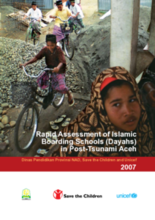The 2004 Boxing Day Tsunami separated thousands of children from their families in Indonesia. Despite the overwhelming scale of the disaster in the Aceh province, nearly 80% of these children spontaneously located and reunited with their parents, extended families and communities without any assistance from Government or humanitarian agencies. An additional close to 2,500 children were reunified with their families through the critical support from agencies involved in the Inter-agency Family Tracing Network. Despite these success, many children - especially those that had spontaneously reunited with the families - were later sent to orphanages or Islamic boarding schools (Dayahs).
This assessment reveals that approximately 15,000 children were sent to 631 Dayahs across Nanggroe Aceh Darussalam (NAD) Province as a result of the Tsunami and its subsequent impacts on the social and economic well-being of families and communities. They were sent to these institutions by parents, siblings or relatives. Often Dayahs were the first institutions to offer shelter, education and care for children affected by the Tsunami, due to their ability to mobilize signifacant social and financial resources. This assessment highlights the important roles that Dayah played in terms of positively supporting communities in the immediate aftermath of the disaster.
However, as Dayahs are primarily educational institutions, the assessment reveals their limited capacity to effectively respond to specific needs of Tsunami affected children. In particular, Dayahs were not well-equipped to provide high-quality institutional care, support for psycho-social recovery or facilitation of the effective return and reintegration of these children to their families and communities of origin.
Furthermore, this study also confirms that a high number of child victims of tsunami who were placed in Dayahs still remain there, without any plan for their return and reintegration. This lack of reintegration planning and supports runs contrary to international commitments and the Government of Indonesia’s 2005 policy on Separated Children in Emergency Situations, both of which emphasize the primary of the family-based care.
This study provides a number of recommendations to support Dayahs in fullfilling their responsibilities towards children in their care more effectively and appropriately. UNICEF urges the government of Indonesia as well as non-government organizations managing Dayahs to implement the recommendations of this study. These recommendations have been constructed as a tool to guide design and implementation of services, in order to increase the protection provided to vulnerable children in NAD who are currently in Dayahs or could be placed in Dayahs in the future.

